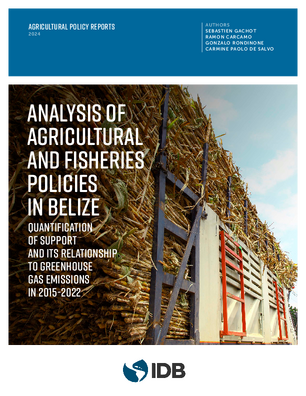Analysis of Agricultural and Fisheries Policies in Belize: Quantification of Support and its Relationship to Greenhouse Gas Emissions in 2015-2022
Date issued
Oct 2024
Subject
Agriculture and Food Security;
Agriculture Support;
Export;
Agricultural Policy;
Agricultural Production;
Sweetener Industry;
Ministries;
Fishery;
Food Security;
Greenhouse Gas Emission;
Government Budget
JEL code
Q18 - Agricultural Policy • Food Policy;
Q10 - Agriculture: General;
O54 - Latin America • Caribbean;
Q17 - Agriculture in International Trade;
Q58 - Government Policy
Country
Belize
Category
Monographs
This study provides an updated analysis of agricultural policies in Belize, utilizing the OECD's Producer Support Estimate (PSE) methodology for the period 2015-2022. During this time, the agricultural sector contributed an average of 8.4% to Belize's GDP, growing by 25%, largely driven by animal production.
The Total Support Estimate (TSE) increased from BZ$90.5 million in 2015 to BZ$97.5 million in 2022, primarily due to a rise in transfers to individual producers (PSE). However, the percentage TSE decreased from 2.1% to 1.7% as GDP growth outpaced TSE growth. Despite this, Belize's agricultural sector remained one of the most supported by public policies in the region, ranking behind Jamaica and Guyana. The percentage PSE averaged 15.8% of farm receipts, higher than in most countries in Latin America and the Caribbean. Market Price Support (MPS) was the largest component of the PSE, accounting for 94% of the total, mainly due to trade protections for domestic poultry producers. Additionally, the percentage General Services Support Estimate (GSSE) averaged 12% of the TSE but declined significantly from 26.8% in 2015 to 4.7% in 2022, primarily because of the conclusion of the EU-funded Sugar Accompanying Measures. Moreover, the percentage Consumer Support Estimate (CSE) was -27% during the period.
This study also introduces the first analysis of fisheries policies in Belize, employing the OECD's Fisheries Support Estimate (FSE) methodology. The percentage FSE averaged 5.9% of total landings over the period, with 98% of the support provided through budgetary transfers to fishers collectively (GSSE). Belize FSE ranked lower than most regional countries, exceeding only Mexico, Chile, and Argentina.
Finally, the study examines the potential contribution of agricultural support policies to greenhouse gas (GHG) emissions. Agricultural policy support was concentrated on poultry, bananas, rice, and pigmeat, which are responsible for only 4.36% of total agricultural GHG emissions. This indicates a weak correlation between agricultural policy support and emissions levels by product.
The study concludes with recommendations to gradually reduce dependence on MPS, prioritize less distortive forms of support, and strengthen efforts in data collection and policy evaluation.
The Total Support Estimate (TSE) increased from BZ$90.5 million in 2015 to BZ$97.5 million in 2022, primarily due to a rise in transfers to individual producers (PSE). However, the percentage TSE decreased from 2.1% to 1.7% as GDP growth outpaced TSE growth. Despite this, Belize's agricultural sector remained one of the most supported by public policies in the region, ranking behind Jamaica and Guyana. The percentage PSE averaged 15.8% of farm receipts, higher than in most countries in Latin America and the Caribbean. Market Price Support (MPS) was the largest component of the PSE, accounting for 94% of the total, mainly due to trade protections for domestic poultry producers. Additionally, the percentage General Services Support Estimate (GSSE) averaged 12% of the TSE but declined significantly from 26.8% in 2015 to 4.7% in 2022, primarily because of the conclusion of the EU-funded Sugar Accompanying Measures. Moreover, the percentage Consumer Support Estimate (CSE) was -27% during the period.
This study also introduces the first analysis of fisheries policies in Belize, employing the OECD's Fisheries Support Estimate (FSE) methodology. The percentage FSE averaged 5.9% of total landings over the period, with 98% of the support provided through budgetary transfers to fishers collectively (GSSE). Belize FSE ranked lower than most regional countries, exceeding only Mexico, Chile, and Argentina.
Finally, the study examines the potential contribution of agricultural support policies to greenhouse gas (GHG) emissions. Agricultural policy support was concentrated on poultry, bananas, rice, and pigmeat, which are responsible for only 4.36% of total agricultural GHG emissions. This indicates a weak correlation between agricultural policy support and emissions levels by product.
The study concludes with recommendations to gradually reduce dependence on MPS, prioritize less distortive forms of support, and strengthen efforts in data collection and policy evaluation.
Generative AI enabled




